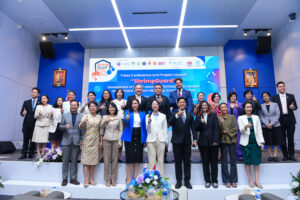
Bangkok, Thailand – August 6, 2024 – The National Center for Genetic Engineering and Biotechnology (BIOTEC), the National Science and Technology Development Agency (NSTDA), and Kasetsart University announce the launch of the collaborative project “ShrimpGuard: Development of Phage-Associated Formulation to Combat Antimicrobial Resistant Vibrio spp. in Cultured Shrimp.” This initiative has been awarded THB 41,605,962 in funding by the International Development Research Centre (IDRC), Canada and UK’s Department of Health and Social Care. The project will run for 32 months, from April 2024 to December 2026.
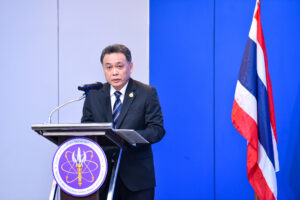
Mr. Permsuk Sutchaphiwat, Permanent Secretary of the Ministry of Higher Education, Science, Research and Innovation stated that shrimp farming is a vital industry for many developing countries, including Thailand, playing a crucial role in economic growth, social development, and food security. Thailand was once the second-largest shrimp producer worldwide. The country cultivates over 90% of its shrimp domestically. But recently, the industry has lost more than half of its market share due to disease, export bans, and unfavorable trade policies. The widespread use of antimicrobials to control Vibriosis, a major disease in shrimp has led to significant antimicrobial resistance (AMR), posing a major challenge to the industry’s sustainability.
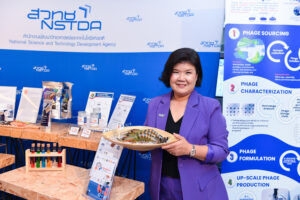
In response, NSTDA, Kasetsart University and partner organizations are developing ShrimpGuard, an innovative solution to effectively and sustainably combat Vibriosis. Dr. Kallaya Sritunyalucksana-Dangtip, Project Principal Investigator from BIOTEC/NSTDA, explained the scientific innovation behind ShrimpGuard: “ShrimpGuard integrates bacteriophages that specifically target harmful Vibrio bacteria with immune enhancers to boost shrimp health. This approach not only combats Vibriosis effectively but also reduces the need for antibiotics, addressing the critical issue of AMR in shrimp farming.” Bacteriophages are viruses that infect and replicate within bacteria. Bacteriophages are found in various environments, for example soil, water, and are used in scientific research and medical applications, particularly as an alternative to antibiotics in treating bacterial infections.
Efficacy data will be gathered from laboratory, pilot, and hatchery tests to optimize the product’s use. The project will also provide practical strategies and data to minimize AMR in shrimp farming and recommendations for using ShrimpGuard under varying climate conditions.
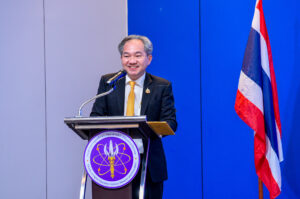
Prof. Dr. Sukit Limpijumnong, President of NSTDA emphasized the importance of this project: “ShrimpGuard represents a major step forward in sustainable shrimp farming. By reducing reliance on traditional antibiotics, we can mitigate the issue of antimicrobial resistance, ensuring the long-term viability of this industry.”

The project also emphasizes the importance of strengthening networks and knowledge sharing. It will build a network of researchers and stakeholders to disseminate knowledge about AMR and promote the use of ShrimpGuard. Prof. Kitiya Vongkamjan Aurand, Principal Investigator Department of Agro-Industry, Kasetsart University (KU). highlighted the collaborative nature of the project: “This initiative brings together leading researchers and policy makers from NSTDA, leading universities like Kasetsart, Thammasat, and Rajamangala University of Technology Tawan-ok, as well as the Department of Fisheries. We also have advisory board experts from global organizations like FAO, regional ones like NACA, and SEAFDEC. Our combined expertise will drive significant advancements in shrimp health management.”
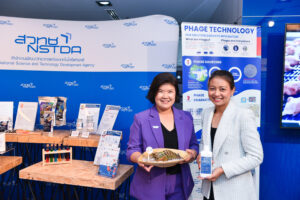
Dr. Sritunyalucksana-Dangtip further explained that educational and outreach programs, including seminars and conferences, will be conducted to educate stakeholders about AMR and ShrimpGuard. “We need to create a campaign to raise awareness and understanding of AMR and promote best practices among relevant stakeholders to reduce the emergence and spread of drug-resistant infections.” ShrimpGuard is expected to be widely adopted by relevant stakeholders, which will help to optimize its efficacy. Farmers and feed mills are welcome to join the consortium as R&D partners or technology users.

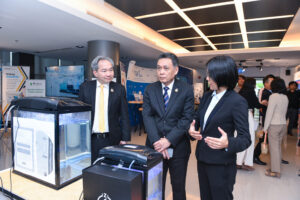
This project holds immense importance for Thailand’s shrimp farming industry, a significant contributor to the national economy. By reducing the reliance on antibiotics and combating AMR, ShrimpGuard will enhance economic stability by improving shrimp farm productivity and sustainability, leading to increased profitability. It will also protect public health by reducing the risk of AMR spreading from shrimp farms to the wider environment and human populations. The project promotes environmental sustainability by encouraging the use of eco-friendly alternatives to harmful chemicals and antibiotics.
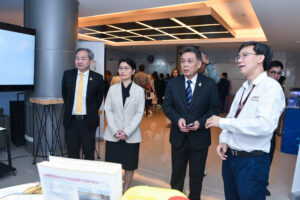
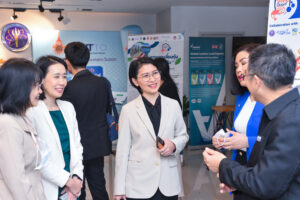
The successful implementation of ShrimpGuard will also strengthen Thailand’s and the region’s global competitiveness in the shrimp farming industry, positioning Thailand as a leader in sustainable aquaculture practices.
